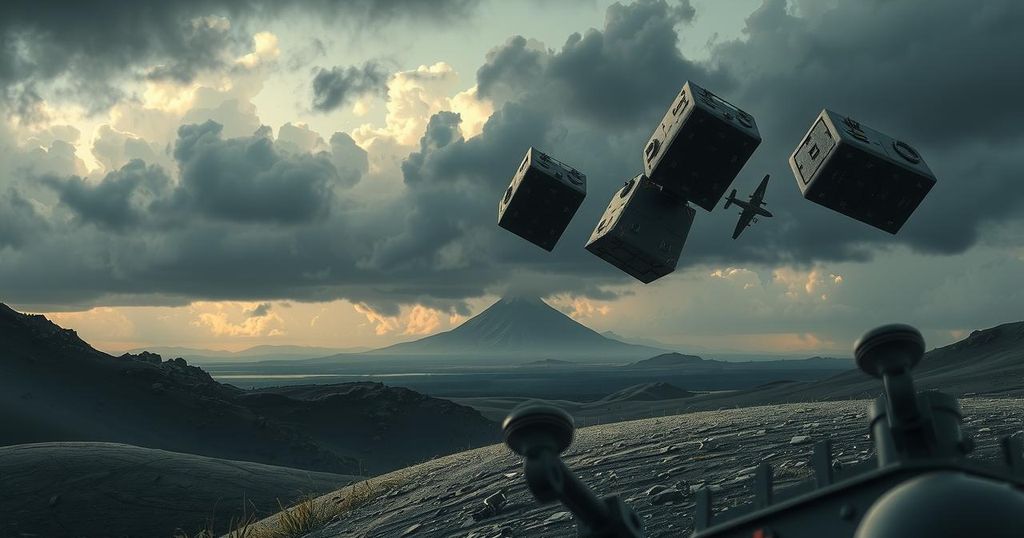The M23 armed group, with assistance from Rwanda, is advancing towards Goma, aided by weaknesses in the Congolese army. Over 230,000 people have fled the violence, and UN reports indicate significant Rwandan military support for M23 operations. Recent territorial gains highlight the ongoing instability and potential humanitarian crises in the region.
The M23 armed group has expanded its territory in eastern Democratic Republic of Congo (DRC) and is currently increasing its hold on Goma, the provincial capital, which faces imminent threats from combat. Experts attribute the ongoing advances of the M23 fighters to weaknesses within the Congolese armed forces (FARDC) and support from Rwanda, raising concerns about a potential offensive against Goma.
Clashes between the M23 and the FARDC have escalated in recent weeks, resulting in significant humanitarian consequences, with over 230,000 individuals displaced since January, as reported by the United Nations. The Congolese army has publicly acknowledged breakthroughs by “the Rwandan army and its M23 puppets” following the fall of Minova, a crucial trading hub near Goma.
A UN report indicated that as many as 4,000 Rwandan soldiers are actively collaborating with the M23, with Rwanda maintaining significant control over the group’s operations. Despite these accusations, the Rwandan government has not openly acknowledged its military actions in the DRC.
Recently, M23 fighters seized Masisi, the administrative capital of a nearby territory, further tightening their grip on the region. The closest confrontation to Goma is now approximately 10 km away, where the armed group threatens to disrupt the city’s economic activities by controlling strategic locations such as Minova.
Although the FARDC and allied militias have established defensive perimeters around Goma, analysts express skepticism regarding their ability to withstand a full-scale offensive. A UN peacekeeping force, known as MONUSCO, is stationed in Goma, although its responses to a potential takeover of the city remain uncertain.
Discussions aimed at resolving the conflict, such as a meeting between Congolese President Felix Tshisekedi and Rwandan President Paul Kagame, have stalled due to disagreements. Experts suggest that current geopolitical conditions may embolden Rwanda and the M23 to advance toward Goma without fear of repercussions.
Concerns have been raised about how domestic political shifts in the United States, particularly a potential return of Donald Trump to the presidency, might affect Rwanda’s actions in the DRC. Kagame has recently noted that significant geopolitical changes are anticipated for the region.
The M23 emerged from a military mutiny in 2012 and previously seized control of Goma before being ousted the same year. After resurfacing in late 2021, the M23 has continued to gain territory while the Congolese military struggles with numerous issues including corruption and low morale, which undermine its response capabilities.
The eastern Democratic Republic of Congo has a long history of conflict, exacerbated by rich mineral resources and the presence of numerous armed groups. The M23 was formed in 2012, primarily by former members of the National Congress for the Defence of the People (CNDP). It has continued to resurface despite previous efforts by the Congolese army and international pressure to subdue its activities. The role of Rwanda in supporting the M23 has drawn significant international attention, with accusations of military aid and control over the group’s operations. The region has remained unstable due to ongoing power struggles and the complex dynamics of multiple competing factions, further complicating peace efforts.
The situation in eastern DRC remains precarious as the M23 strengthens its hold on key areas near Goma, with implications for regional stability. Weaknesses in the FARDC and external support for the M23 from Rwanda facilitate the group’s advances despite international scrutiny. The lack of effective responses from the UN peacekeeping forces and regional military allies raises serious concerns about the impending humanitarian crisis and the future of the DRC.
Original Source: www.barrons.com






